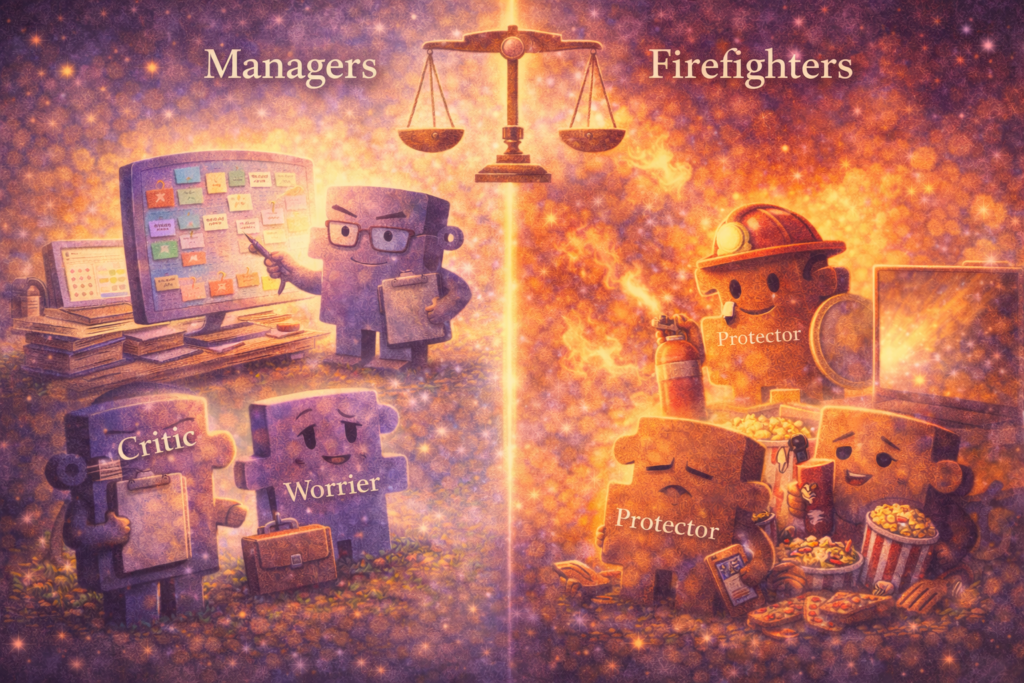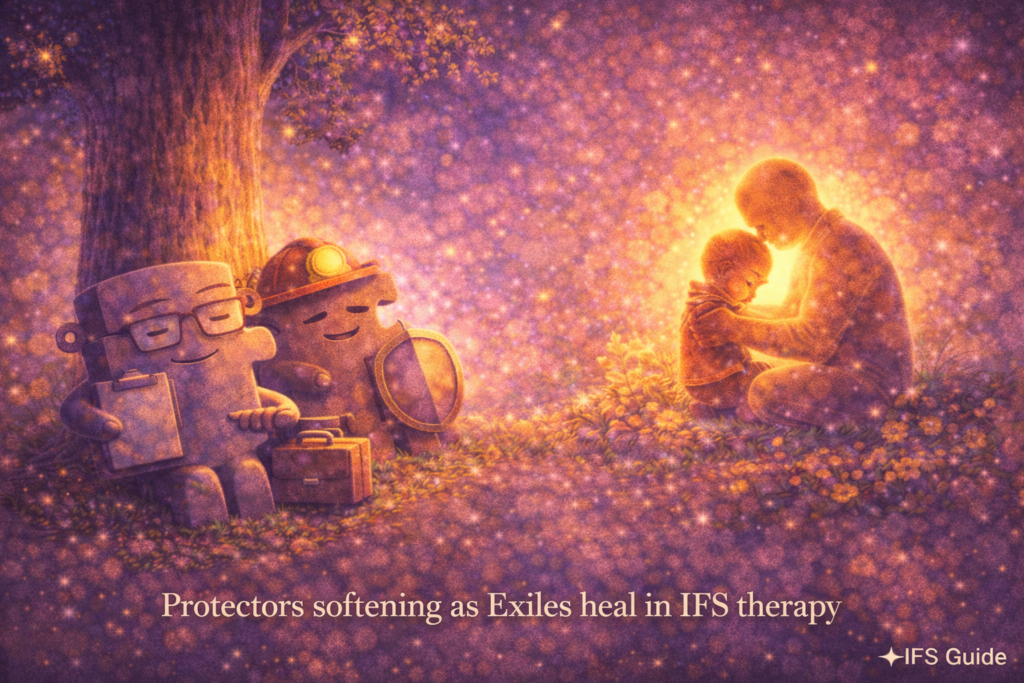What are Protectors in IFS?
Understanding Their Role in Your Healing Journey 🛡️🌱


Meet Your Inner Protectors—Your Personal Bodyguards 🛡️
Ever feel like a part of you is running around with a clipboard shouting “Do better!” while another part is shoving snacks and Netflix at you? 🎬🍕 Welcome to the fascinating world of Protectors in Internal Family Systems (IFS)!
Protectors are like your inner bodyguards, working tirelessly to shield you from pain, discomfort, or vulnerability. Sure, their methods might be a bit extreme (think of them as drama queens with a cause 😂), but their intentions are always positive.
In this article, we’ll cover:
- What Protectors are in IFS.
- The two types of Protectors: Managers and Firefighters.
- How Protectors develop and why they act extreme.
- Ways IFS therapy helps you work with, not against, your Protectors.
By the end, you’ll understand why Protectors behave the way they do and how to collaborate with them for inner harmony. 🌿✨
This article is for anyone new to IFS or curious about why certain behaviors feel automatic, extreme, or hard to change.
What Are Protectors in IFS? 🛡️🧠
In Internal Family Systems, Protectors are the parts of your internal system tasked with defending you from emotional pain or perceived danger. Think of them as your mind’s security detail, always on alert—even if the threat is just an awkward email reply. 📧😅 Protectors are not symptoms to eliminate—they are intelligent Parts that learned extreme strategies to keep the system safe.
These loyal inner guards may use strategies that seem counterproductive at times, such as:
- A Critical Part pushing you to work harder to avoid failure.
- An Avoidant Part numbing you with endless distractions.
- An Angry Part lashing out to prevent vulnerability.
Protectors aren’t trying to ruin your life; they’re just overzealous employees who think their job description is “Do whatever it takes.” 💼🤷
Learn more about IFS for Anger, Rage, and Bitterness
The Two Types of Protectors in IFS 🔍🔄
All Protectors share the same goal: preventing Exiles from being overwhelmed or re-injured. However, IFS splits Protectors into two categories: Managers and Firefighters. They share the same goal—keeping you safe—but they take very different approaches.
1. Managers: The Proactive Planners 📋
Managers are the Parts that proactively prevent pain or discomfort. Imagine them as the overachievers in your inner office—they’ve got color-coded spreadsheets and a five-year plan for avoiding failure. 📊💼
Roles of Managers:
- Keeping everything in control and organized.
- Avoiding emotional triggers for deeper wounds.
- Managing relationships to prevent rejection or conflict.
Examples of Manager Protectors:
- The Perfectionist: Sets impossibly high standards to protect you from criticism.
- The Worrier: Keeps you on edge, scanning for potential disasters (even imaginary ones). 🌪️
- The People-Pleaser: Avoids conflict by focusing entirely on others’ needs.
How Managers Affect Your Life:
While Managers keep things running, they can also push you into overthinking, procrastination, or burnout. It’s like trying to sprint a marathon while carrying the weight of the world—and a giant to-do list. 🏃♀️🗒️
What are Managers in IFS?

2. Firefighters: The Reactive Rescuers 🚒🔥
When emotional pain breaks through the Managers’ defenses, Firefighters swoop in like superheroes with questionable strategies. 🦸♂️ They focus on putting out emotional “fires” ASAP, even if it means creating new issues.
Roles of Firefighters:
- Distracting you from emotional pain.
- Numbing overwhelming feelings.
- Reacting impulsively to escape discomfort.
Examples of Firefighter Protectors:
- The Avoider: Suggests snacks, social media, or endless TikToks as the ultimate escape. 📱🍕
- The Addict: Uses substances or compulsive behaviors to numb feelings.
- The Angry Defender: Reacts with rage to shut down vulnerability.
How Firefighters Affect Your Life:
While Firefighters provide temporary relief, they can also lead to self-sabotage—like procrastination, emotional outbursts, or unhealthy coping habits. They mean well but often act like that friend who suggests ice cream for breakfast when you’re sad. 🍦😅
Why Do Protectors Exist? Understanding Their Origins 🧬
Protectors develop in response to emotional wounds or traumas, often from childhood experiences. These Parts step in as survival mechanisms to shield you from harm.
For example:
- A Perfectionist Manager may form after being criticized for mistakes, striving to prevent failure.
- A People-Pleaser might emerge to maintain connections after feeling abandoned.
- A Firefighter might turn to distractions like overeating to avoid emotional pain.
While these strategies helped you survive tough times, they can become outdated and overbearing as you grow. It’s like a software update that never quite installed correctly—time for a system reboot! 💻🔄
The Connection Between Protectors and Exiles 💔🔗
Protectors’ primary role is to shield Exiles—the wounded Parts of you that carry deep pain, fear, or shame. Exiles are often “locked away” because their feelings can be overwhelming.
Examples of Protector-Exile Dynamics:
- A Perfectionist Manager shields an Exile carrying the belief, “I’m not good enough.”
- A Firefighter numbs emotions to stop an Exile’s sadness from surfacing.
Healing happens when you build trust with Protectors, allowing them to relax, so you can connect with and care for Exiles. 🌱
What are Exiles in IFS?

How IFS Helps Protectors Relax and Heal 🧘♀️✨
IFS therapy works with Protectors, not against them. Here’s how:
1. Identify Your Protectors 🧠
Pay attention to your inner dialogue when stressed. Name the Parts that show up (e.g., “The Critic” or “The Avoider”).
2. Approach Protectors with Curiosity 🔍
Ask questions like:
- “What are you trying to protect me from?”
- “How long have you been doing this job?”
- “What do you need to feel safe?”
Pro tip: Don’t interrogate them like a detective—think more like a curious friend. 🕵️♀️👯
3. Build Trust and Appreciation 🤝
Thank your Protectors for their hard work, even if their strategies seem unhelpful. Let them know you’re here to lead with calm confidence.
4. Unburden the Exiles 💔🕊️
Healing the Exiles that Protectors shield allows them to step back from their extreme roles. It’s like finally getting that demanding coworker to take a vacation. 🏖️🍹
Learn more about Common Protectors’ Fear here
Practical Example: Healing a Perfectionist Protector 📋🔧
- Notice the Perfectionist when it shows up during work stress.
- Ask, “What are you afraid would happen if I didn’t work so hard?”
- Listen: It might say, “I’m protecting you from failure and feeling worthless.”
- Reassure it: “Thank you for trying to help. I’ve got this.”
- Over time, build trust and explore the Exile it’s protecting.
Final Thoughts: Protectors Are Not Your Enemies—They’re Your Allies 🛡️💚
Protectors in IFS are like loyal guards working overtime to keep you safe. By understanding their motivations and building trust, you can help them relax and transform into supportive Parts of your team. When Protectors feel understood and no longer alone in their role, they naturally soften—and healing becomes possible.
Ready to meet your Protectors?
👉 Download the IFS Guide App here
Remember: Every Part has a purpose, and every Part deserves compassion. 🌟💛
FAQ
A: There are two types of Protectors in IFS: Managers and Firefighters. Managers proactively prevent pain by maintaining control, while Firefighters reactively deal with emotional pain by distracting or numbing you.
A: Protectors often adopt extreme behaviors because they believe their job is to do whatever it takes to keep you safe from harm, even if it means using counterproductive strategies.
A: Firefighters in IFS may engage in behaviors like overeating, substance use, or compulsive distractions like social media browsing to numb emotional pain or escape discomfort.
A: Protectors work to shield Exiles, which are the wounded parts of you that carry deep emotional pain, fear, or shame. By protecting Exiles, Protectors prevent their overwhelming feelings from surfacing.
A: Healing involves building trust with Protectors so they can relax their guard, allowing you to access and care for the Exiles they are protecting, ultimately leading to greater inner harmony.
A: You can learn more about IFS by subscribing to updates on the latest challenges and workshops, downloading the IFS Guide App, and participating in events like the IFS Webinar or Bootcamps.
Monthly IFS Workshops & Challenges!
Every month we organize online workshops to help you get a deeper understanding of IFS!
